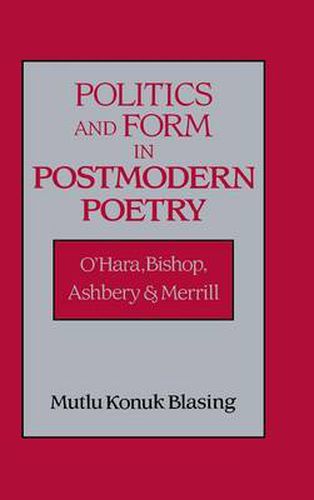Readings Newsletter
Become a Readings Member to make your shopping experience even easier.
Sign in or sign up for free!
You’re not far away from qualifying for FREE standard shipping within Australia
You’ve qualified for FREE standard shipping within Australia
The cart is loading…






Approaching post-World War II poetry from a postmodern critical perspective, this study challenges the prevailing assumption that experimental forms signify political opposition while traditional forms are politically conservative. Blasing defines postmodern poetry as a break with modernism’s valorisation of technique and its implicit collusion with technological progress. She shows how four major postwar poets - Frank O'Hara, Elizabeth Bishop, John Ashbery, and James Merrill - cannot be read as politically conservative because formally traditional or as culturally oppositional because formally experimental. All these poets acknowledge that no one form is more natural than another, and no given form grants them a superior position for judging cultural and political arrangements. Their work plays an important cultural role precisely by revealing how meanings and values do not inhere in forms but are always, irreducibly, rhetorical.
$9.00 standard shipping within Australia
FREE standard shipping within Australia for orders over $100.00
Express & International shipping calculated at checkout
Approaching post-World War II poetry from a postmodern critical perspective, this study challenges the prevailing assumption that experimental forms signify political opposition while traditional forms are politically conservative. Blasing defines postmodern poetry as a break with modernism’s valorisation of technique and its implicit collusion with technological progress. She shows how four major postwar poets - Frank O'Hara, Elizabeth Bishop, John Ashbery, and James Merrill - cannot be read as politically conservative because formally traditional or as culturally oppositional because formally experimental. All these poets acknowledge that no one form is more natural than another, and no given form grants them a superior position for judging cultural and political arrangements. Their work plays an important cultural role precisely by revealing how meanings and values do not inhere in forms but are always, irreducibly, rhetorical.